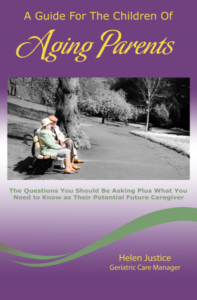The first step in organizing a rational care plan is making a list of needs. As family members or friends care for an impaired elderly person, several questions present themselves:
What are his/her needs?
- What kinds of care are needed to allow the elderly/impaired person to remain in the community?
- Who is going to provide the care? When? How?
- Should the care-receiver remain in his/her own home, live with the children or other relatives or move to other surroundings (retirement apartments, residential care, intermediate care, skilled nursing facility or other)?
- How can living arrangements be changed to help the person stay in the home or become more independent?
- If outside services are needed, does the impaired person have the resources to pay for them? How can they be obtained?
- How can care be given to the person in need without denying attention to others (spouse or children) for whom the caregiver also has responsibility?
- Do you as the caregiver feel tired or frustrated from caring for an older person?
In answering these questions you are developing an important List of Needs of the impaired elderly person, and bringing into perspective the caregiver’s needs as well. The questions do not have easy answers and the solution may vary in every situation. The care of an impaired older person can create stress that affects the ability of the caregiver to continue giving necessary levels of care. The stress experienced may be physical, financial, environmental and/or emotional in nature.
Physical Stress
Providing physical care to an impaired older person can cause physical stress. General homemaking and housekeeping activities such as cleaning, laundry, shopping, and meal preparation require energy and can be tiring, particularly when added to existing responsibilities in one’s own home.
Personal care required for the supervision of medications and the maintenance of hygiene can also be stressful, particularly in situations of acting-out behaviors, incontinence (loss of bladder or bowel control), colostomies, or assistance with bathing. Lifting and transferring individuals with limited mobility is not only tiring, but also can result in injury to the caregiver or the impaired person. In some instances there is the additional responsibility of maintenance of equipment such as wheelchairs or hospital beds.
Financial Stress
The care of an impaired elderly person has many financial dimensions. For those services that cannot be provided by family members (medical, pharmaceutical, therapeutic, etc.), decisions will have to be made as to where service will be secured and how they will be paid. When money is limited, many families assist with the cost of care, causing financial burdens on all family members.
Environmental Stress
The proper home setting has to be chosen. If the care-receiver elects to remain in his/her own home, modifications such as railings and ramps may have to be installed. If the person cannot remain in his/her own home, alternative arrangements must be sought, such as moving in with a friend or relative or specialized housing (retirement hotels, senior apartments, residential care homes, intermediate care facilities, or nursing homes). If the care-receiver is to remain in the home, some major adjustments in the living arrangements and patterns of daily living will be necessary.
Social Stress
Providing personal care up to 24 hours a day can cause social stress by isolating oneself from friends, family and a social life. The caregiver may find him/herself becoming too tired or unable to have an evening out even once a week, or once a month. What can result is a build-up of anger and resentment toward the very person receiving the care, as the care-receiver is the cause of the lost socialization.
Emotional Stress
All of these factors often result in tremendous emotional stress. Compounding these sources of stress are the difficulties in managing one’s time, juggling multiple responsibilities, and feeling the pressure of the increased dependency.
Conclusion
For family members providing care, the various forms of stress can result in different feelings. Anger, resentment and bitterness about the constant responsibilities, deprivation and isolation can result. This is also a time when many of the unresolved conflicts from parent-child relationships resurface and can intensify, causing anxiety and frustration. There might even be the unspoken desire, at times, to be relieved of the burden through institutionalization or even death of the care-receiver. This desire is frequently and swiftly followed by feelings of guilt. All of these can be felt, then denied because they seem unacceptable. The person giving care needs to be assured that, in fact, these feelings are common even though they may not be expressed. There are resources that can help caregivers. The remainder of this book will address those resources, such as joining a caregiver support group, using community resources and above all, caring for yourself the caregiver.
Copyright 2017 – Helen Justice GCM – Elder Care Navigator and Advocate – Advanced Wellness GCM, Inc
Known by many as “The Elder Care Navigator”, Helen Justice is a Certified Geriatric Care Manager trained to assist elders and their families with the process of aging with dignity and grace. Her knowledge and experience insures elders obtain quality care and transitional preparation for their future. More important than the financial aspect of aging is the social and emotional component that elder care places on the family. Go to www.advancedwellnessgcm.com for information on no fee seminar.



Stay Up To Date With AWGCM